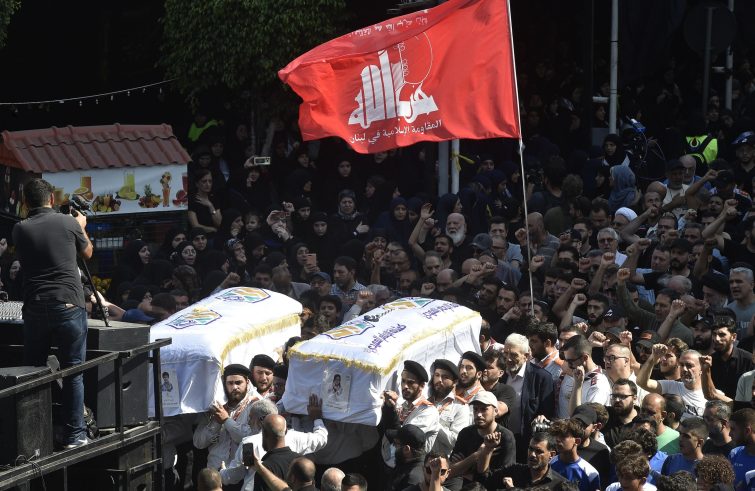
Beirut mourns its child victims. The Lebanese Health Ministry said three people, including two children, were killed in the Israeli attack on Beirut’s southern suburbs, which left 74 people wounded, as the search for the missing continues under the rubble. The white coffins have now arrived, accompanied by a large crowd of people. The two children will be buried in the Rawdet el Haoura Zeinab cemetery, a burial site usually reserved for martyred fighters. The father is still hospitalised, and the mother is in a state of shock. She said she arrived a few minutes after the rest of the family and had just entered the building when everything started trembling. Her daughter Amira was a ‘flower’, her mother said, in tears, adding that she was also very close to her brother.
“At the time of the attack they were hugging each other, that’s how they arrived at the hospital,” she says. The oldest son, who is being treated for burns, has not yet been told that his brother and sister are dead.
The tears of the women are the most saddening aspect of any war. Today, the tears of mourning are those of the Lebanese women. Late on Tuesday afternoon, the Israeli army launched a targeted attack in Beirut to kill the Hezbollah commander whom Israel holds responsible for last Saturday’s rocket strike that killed 12 children and teenagers in Majdal Shams, a town on the Golan Heights, a disputed territory that has been under Israeli control for decades. Amira and Hassan were children too. “Today in Beirut is just like any other day,” says Fady Noun, an independent Lebanese journalist. “The country is gripped by fear and anxiety. We don’t want the situation to escalate, but we fear that certain boundaries have been broken. And it’s traumatising.”
Lebanon has no desire to go to war, the Lebanese government said in an emergency cabinet meeting on Wednesday, and it formally mandated the Foreign Minister to engage in all the necessary talks to avoid an escalation.
The crisis triggered by the conflict involving Hamas, Hezbollah and Israel has hit Lebanon, which has been facing severe economic difficulties for years. In the summer, Beirut airport normally saw almost 14,000 arrivals a day. But since yesterday, the trend has reversed. There have been many flight and hotel cancellations. In addition, many people are fleeing the country. The summer season has always brought some respite, especially for the tourist industry. This will not be the case this year. “The economic crisis in Lebanon is a banking crisis,” says Noun. Since 2019, Lebanese depositors have been unable to access their bank accounts. “We live off the financial aid provided by people in the Gulf, the US and Canada, South America. Our country is a country that lives abroad.” In addition to the economic crisis, there is also a crisis on the Israeli border. It is estimated that at least 100,000 Lebanese residents have fled villages that were bombed or threatened with bombings. Many of them have reached Beirut. Lebanon is therefore also experiencing a refugee problem. Some people remained in their hometowns, but they live in the constant fear of shelling attacks.
“We expected the crisis to be resolved relatively soon, we thought it would last a few months. But ten months have passed since 7 October.”
Lebanon is a divided country. In the view of Fady Noun, “Hezbollah initiated hostilities with Israel on its own initiative, acting unilaterally. The authority to decide to go to war resides solely with the Lebanese state. They have encroached upon our national sovereignty. It was assumed that the crisis would be contained and that the country would resume its ordinary life, despite the ongoing war of attrition in the south. However, the death of Hamas leader Ismail Haniyeh, who was killed in Tehran on Tuesday night with one of his bodyguards, has effectively altered the situation.” Beirut offers little prospect of hope at this time. “There is only one hope”, says Noun, “and that is that the crisis will not escalate into an all-out regional war. But despite the US’s stated desire to avoid such a conflict, it is unclear how sincere they are in this regard. Similarly, Iran’s stated opposition to war is also open to question. Indeed, 90% of Lebanese people oppose the war, as do Syria and Jordan.”
“The question is: who wants this war?”
The Lebanese journalist continues: “We should never forget that the fate of Palestine is at the heart of the current turbulence in the Middle East. Will there be a Palestine? That is the starting point if we are to have any understanding of what is happening right now.”












